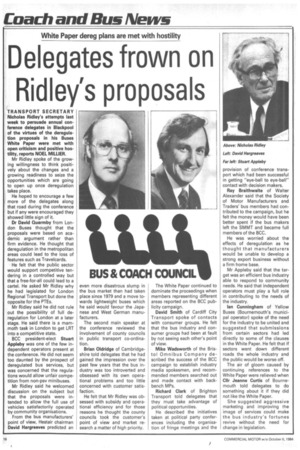Delegates frown on Ridley's proposals
Page 20

If you've noticed an error in this article please click here to report it so we can fix it.
TRANSPORT SECRETARY Nicholas Ridley's attempts last week to persuade annual conference delegates in Blackpool of the virtues of the deregulation proposals in his Buses White Paper were met with open criticism and positive hostility, reports NOEL MILLIER.
Mr Ridley spoke of the growing willingness to think positively about the changes and a growing readiness to seize the opportunities which are going to open up once deregulation takes place.
He hoped to encourage a few more of the delegates along that road during the conference but if any were encouraged they showed little sign of it.
Dr David Quarmby from London Buses thought that the proposals were based on academic argument rather than firm evidence. He thought that deregulation in the metropolitan areas could lead to the loss of features such as Travelcards.
He felt that the public sector would support competitive tendering in a controlled way but that a free-for-all could lead to a cartel. He asked Mr Ridley why he had legislated for London Regional Transport but done the opposite for the PTEs.
Mr Ridley said he did not rule out the possibility of full deregulation for London at a later stage. He said there is a mammoth task in London to get LRT into a competitive state.
BCC president-elect Stuart Appleby was one of the few independent operators present at the conference. He did not seem too daunted by the prospect of deregulated bus services, but was concerned that the regulations would allow unfair competition from non-psv minibuses.
Mr Ridley said he welcomed discussion on the subject but that the proposals were intended to allow the full use of vehicles satisfactorily operated by community organisations.
From the bus manufacturers' point of view, Hestair chairman David Hargreaves predicted an even more disastrous slump in the bus market than had taken place since 1979 and a move towards lightweight buses which he said would favour the Japanese and West German manufacturers.
The second main speaker at the conference reviewed the involvement of county councils in public transport co-ordination.
Brian Oldridge of Cambridgeshire told delegates that he had gained the impression over the past few years that the bus industry was too introverted and obsessed with its own operational problems and too little concerned with customer satisfaction.
He felt that Mr Ridley was obsessed with subsidy and operational efficiency and for those reasons he thought the county councils took the customer's point of view and market research a matter of high priority. The White Paper continued to dominate the proceedings when members representing different areas reported on the BCC publicity campaign.
David Smith of Cardiff City Transport spoke of contacts with consumer groups. He felt that the bus industry and consumer groups had been at fault by not seeing each other's point of view.
Mike Wadsworth of the Bristol Omnibus Company described the success of the BCC campaign to establish industry media spokesmen, and recommended members searched out and made contact with backbench MPs.
Richard Clark of Brighton Transport told delegates that they must take advantage of political opportunities, He described the initiatives taken at political party conferences including the organisation of fringe meetings and the provision of conference transport which had been successful in getting "eye-ball to eye-ball" contact with decision makers.
Ray Braithwaite of Walter Alexander said that the Society of Motor Manufacturers and Traders' bus members had contributed to the campaign, but he felt the money would have been better spent if the bus makers left the SMMT and became full members of the BCC.
He was worried about the effects of deregulation as he thought that manufacturers would be unable to develop a strong export business without a firm home base.
Mr Appleby said that the target was an efficient bus industry able to respond to community needs. He said that independent operators must play a full role in contributing to the needs of the industry.
Ian Cunningham of Yellow Buses iBournemouth's municipal operator) spoke of the need for the industry to be united and suggested that submissions from certain sectors had led directly to some of the clauses in the White Paper. He felt that if sectors went down different roads the whole industry and the public would be worse off.
The air of gloom caused by continuing references to the White Paper were relieved when Cllr Jeanne Curtis of Bournemouth told delegates to do something about it if they did not like the White Paper.
She suggested aggressive marketing and improving the image of services could make the bus industry's fortunes revive without the need for change in legislation.




























































































































































